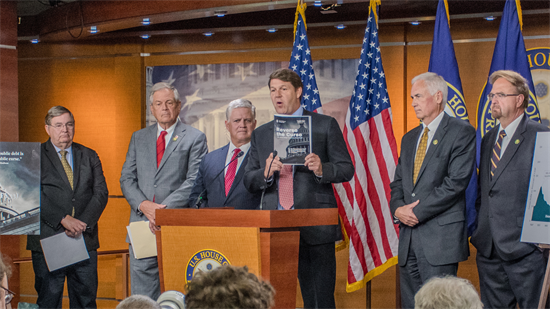In the News
REP. JODEY ARRINGTON: Fiscal Responsibility Begins By Ending Beltway Budget GimmicksDailey Caller Opinion by Rep. Jodey Arrington
Washington,
April 9, 2024
Tags:
Economy
REP. JODEY ARRINGTON: Fiscal Responsibility Begins By Ending Beltway Budget GimmicksBy Rep. Jodey Arrington Congress recently passed two mammoth appropriations bills providing for about $1.8 trillion in spending, spanning the entire federal government’s discretionary budget, for the rest of the current fiscal year. While some might say “better late than never,” a crucial question lingers: do we — and in this, I include members of Congress — even understand how much spending this convoluted process produced? The answer is a resounding no. The reporting and accounting process for federal spending is so opaque that even members of Congress who have “read the bill” don’t truly understand it. Imagine, then, how hard it is for the public trying to navigate this accounting labyrinth that shrouds Washington’s spending habits. Press releases by my colleagues boasted of spending being capped at $1.59 trillion based on the Fiscal Responsibility Act. Yet the Congressional Budget Office estimates actual deficit impact of these combined measures will be about $200 billion more. What gives? Congress has a grab bag of tricks and gimmicks that hide and obscure fiscal reality. That’s why my colleagues and I at the House Budget Committee are advancing a package of reforms that will bring more transparency and accountability to the process. It should be harder to spend and impossible to hide spending. Our reforms will, for the first time, cap outlays, or total spending, in addition to just budget authority. We will better define real emergencies, so that the floodgates only open for real floods. And we will ban the practice of using gimmicks that boost spending without producing any real budgetary savings. The American people often accuse Congress of playing by different rules — and they’re right! The congressional budgeting process is case in point. If an individual, business or state and local elected official attempted to use Congress’s off-balance sheet accounting, they would be fined or fired. It’s important to understand how we got here and the steps we can take to fix it. First, this is not a new problem. It’s been going on for decades. The current process was established a half century ago by the 1974 Congressional Budget and Impoundment Control Act, which defines “spending” in two different ways — “budget authority” and “outlays.” Budget authority refers to new money that can be obligated annually — kind of like a credit card limit on spending for a year. Outlays refers to the amount of money that actually goes out the door every year. Think of it this way. Congress provides $2 billion in “budget authority” to build a new Navy vessel, but the new ship takes four years to build. So in this example, the actual “outlays” are $500 million each year for four years. So far so good. That type of accounting makes sense. But then Congress began to tweak the budget laws — first with the Gramm-Rudman-Hollings Act in 1985 and then the Budget Enforcement Act in 1990. Those laws imposed spending “caps” for the first time on budget authority, which launched a new cottage industry — Congress finding ways around the spending limits. This is where much of today’s obfuscation began and when spending gimmicks began to bloom like cherry blossoms. One common trick is “emergency spending.” Emergencies happen — wildfires, floods, hurricanes, earthquakes. Under congressional rules, spending on emergencies doesn’t count against budget authority limits. So theoretically, spending on anything Congress deems an “emergency” is not constrained. Enter many creative definitions of “emergencies.” For example, all the spending in the 2021 bipartisan infrastructure bill was declared “emergency” and not subject to any spending limit. Another way Congress avoids spending limits are so-called CHIMPs (Changes in Mandatory Programs). With a CHIMP, Congress reduces budget authority in a mandatory, automatic spending program that is over-budgeted and won’t be spent anyway and transfers that budget authority to a discretionary program, where it will be spent. That fiscal sleight of hand means the new discretionary spending does not count against the budget authority cap, meaning more outlays and higher deficits but no change in budget authority. Many of the backroom budget deal dilemmas in recent memory have been solved by these CHIMPs. To restore fiscal responsibility in Washington, we must start with an accurate and honest accounting of how we spend taxpayer dollars. We must pull back the curtains on congressional spending and inside-the-beltway budget gimmicks. The practice of keeping two sets of books and numbers encourages the kind of profligacy that created our current fiscal mess. Our reforms will provide more clarity, accountability and honesty to how Congress spends your money. Jodey Arrington is the Chairman of the House Budget Committee and represents Texas’s 19th Congressional District in the U.S. House of Representatives. The views and opinions expressed in this commentary are those of the author and do not reflect the official position of the Daily Caller.
|



